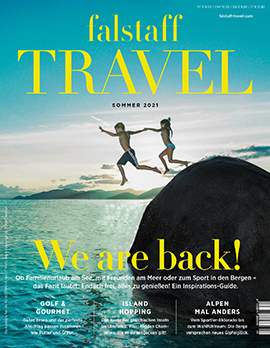
Northern Italy - A review by Markus Lanz
Markus Lanz is one of the most successful TV presenters in Germany and also works as a podcaster, documentary filmmaker and photographer. The north Italian wishes his homeland the courage to preserve its heritage.
September 11, 2024
Lanz has retained his connection to the backdrop of his north Italian childhood and youth. © lookphotos / ClickAlps
From radio station volunteer to Germany's most prominent television personality in just a few years - such a rapid career can probably only be achieved by a north Italian. Someone like Markus Lanz. The presenter was born in Bruneck in 1969, grew up in the Puster Valley and began his career after school and military service in Italy by training as a communications manager in Munich. Next stop: Radio Hamburg. The rest is history - from radio he went on to RTL, from there to ZDF. Lanz has long held two passports, one Italian and one German. And although his intonation in his professional life is devoid of Alpine inflections, his personality shows clear north Italian influences. From his modest demeanor to his boundless commitment to the cause he is passionate about everything. After appearing on major ZDF shows such as "Wetten dass...?" and "Menschen", fifteen years ago he was given a talk show bearing his name and which he has been producing himself for a long time.
This is how his audience knows and appreciates him: Markus Lanz as the eloquent host of his TV show. © Markus Hertrich
He also finds time for photography, documentary films and a podcast with Richard David Precht. "Northern Italy is an incredibly beautiful place, perhaps one of the most beautiful places on earth," says Markus Lanz. As a frequent traveler who has made it as far as the North Pole and other remote corners, he has seen and experienced many of the most attractive landscapes in the world. But, as he once warned the "Südtiroler Wirtschaftszeitung", the beauty of northern Italy also means responsibility.
Lanz loves photography and has also made a name for himself with the visual language of his reports. © provided
Under no circumstances should we behave as if we had a second northern Italy up our sleeve. As this isn't the case, the question must be asked as to how many more hotels the country needs. And - perhaps even more importantly - how many it can sustain. The traffic situation, which is often tense due to the influx of visitors, also requires new ideas. "For example, we need to consider whether motorcyclists really need to use every pass, and if so, whether there really need to be so many." Even in November, the roads are now full. "I don't remember that from my childhood," says Lanz. "You just have to be careful not to overload the infrastructure."
If you can travel, you want to go to northern Italy
As sure-footed as he is experienced in the mountains: As a north Italian child, Markus Lanz feels right at home on the summit. © provided
Lanz also sees northern Italy as a victim of its own success. In addition to the economic stability and solid prosperity of a region that was poor just a few generations ago, it has also given rise to problems. With incredible diligence and great creativity, the north Italians have succeeded in building a tourism industry that is unparalleled in terms of quality. "The people have really made something of it." Northern Italy is perceived globally and is now known to travelers all over the world: "Anyone who can travel now has northern Italy on their radar." This makes it all the more important to ensure that the beauty and unique nature of the region is preserved - for ourselves and for future generations.
Dietmar Denger / laif / picturedesk.com
For Lanz, another effect of the tourism business is that people are beginning to feel alienated from their homeland. "In recent years, I've heard the phrase time and again: 'It's all just for the tourists'," he says. Such a sell-out, even if it's only perceived as such, goes too far. When people distance themselves from their home town, the phenomenon of beloved vacation destinations being sold off often begins, as the example of Venice shows. That's why it is not the right political approach to turn a blind eye to every new project and wave it through. "It hurts my soul when I see an old mountain farm being bulldozed." A piece of identity disappears with every farm. "Why are we not able to understand this heritage as a cultural asset?" Of course, restoration often costs more than demolition and new construction. "But after all, holidaymakers don't come to northern Italy to see new buildings."
Read more: Tanja Raich: Summer in Northern Italy

This article appeared in the Falstaff TRAVEL issue South Tyrol Special 2024.






